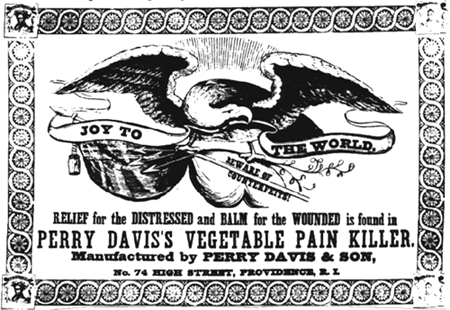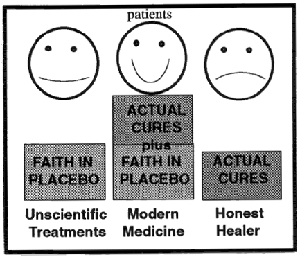This phenomenon is called "the placebo effect".Placebos are always used in scientific tests to determine how effective a drug is. Two groups are given pills. One gets placebos and the other gets the real thing; but both sides think they are getting the real thing. Any success rate for the drug being tested must be adjusted by subtracting the placebo's success rate. If 28% of the people using a new drug report improvement after taking the drug, and 21% of those taking the placebo report improvement, then the new drug only has a success rate of 7%.
They say it is justified, on the grounds that at least 20% of the public is being helped by their sugar tablets. Indeed, modern doctors often prescribe sugar pills too, when they do not know what else to offer their patients.

By publicising testimonies of those who claim to have been helped by a placebo (and refusing to mention those who have not been helped), a shrewd practitioner can generate greater faith in himself/herself, which, in turn, results in an even more dramatic placebo effect.
Other tricks can be used to push the successrate even higher.
For example, an iridologist was filmed examining a patient who secretly suffered from migraines.
The iridologist looked into the patient's eyes and asked, "Do you suffer from headaches?"
The amazed patient asked, "How did you know that was my problem?" But the iridologist didn't know what the problem was. She only asked a routine question -- one that is usually answered in the affirmative, (making patients think the woman must be pretty clever). Headaches are one of the most universal of human sufferings. It just happened that in this case she hit the jackpot, because a headache was the primary reason for the visit.
A good magician never tells you what he/she is going to do ahead of time, so that the act can be varied if things go wrong. Quacks do the same thing. The iridologist in question would not have been embarrassed even if the patient had said that he never had a headache in his entire life, since she never said she was diagnosing the patient's illness. But the patient, the reporter, and the TV audience all missed this, and they were all left with the impression that they were seeing proof of the effectiveness of iridology. Consequently, the woman's credibility (placebo effect) would have been higher after the report was broadcast on TV.
The personal attention given to patients by alternative practitioners is often what attracts the public to them in the first place. But this personal attention also places an emotional obligation on a patient to reaffirm the practitioner's boasts in return.
It's hard to tell a sympathetic comforter that their efforts were wasted, so we flatter them instead.
Faith-healers often work in a climate where just being sick implies some moral disability on the part of the patient, and they know how to exploit this. Patients are urged to prove their faith by "claiming" their healing. This means that patients should testify to having been healed even when they have not (assured by the healer that God will reward such faith with a healing sometime after the testimony has been made). When the "claim" does not come to pass, it is extremely embarrassing for professing Christians to admit that they were party to a deception. Meanwhile the rest of the congregation is doing the same thing, in the hope of getting the healing which they assume the previous sucker "claimed" to have.
Nevertheless, in the midst of all this "positive thinking" by faith-healers and alternative practitioners, some people really do find some relief, and the placebo effect is enhanced. Such cases are offered as justification for the whole game.
The placebo issue is one that anyone interested in a healing ministry is going to have to deal with sooner or later. Treatments must have some genuine curative quality to beat a placebo in a contest where both are claiming to hold the cure. But what are your chances of beating the placebo if you refuse to even promise a cure? By refusing to give patients false hope, you lose out on the cures that would come just from blind faith in yourself.
 A doctor friend found himself unable to succeed in private practice because he insisted on being honest with patients. "They don't want to hear that I'm not sure what they've got," he complained. "They want to be assured that everything is under control whether it is or not."
A doctor friend found himself unable to succeed in private practice because he insisted on being honest with patients. "They don't want to hear that I'm not sure what they've got," he complained. "They want to be assured that everything is under control whether it is or not."
On the surface it would appear that being honest with patients is going to hamper your ability to heal. But it really only hampers your ability to generate false faith in you or in your treatments. As Christians, we are not told by Christ to con the sick; we are told to heal them. Actually, it's God who does the healing anyway, so we had better play by his rules if we want to remain in the partnership.
Let the "evil generation" have their "signs and wonders". It is our job to demonstrate love, faith, and honesty.
And somehow, in the end, I think that these are the things that will come out on top anyway.

















